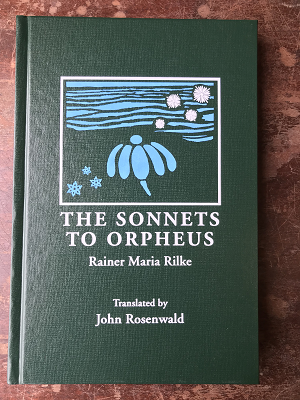
FARMINGTON – On Thursday, John Rosenwald will present half a century’s worth of work at a Centenary Celebration devoted to his translation of Rainer Maria Rilke’s Sonnets to Orpheus.
Considered his generation’s greatest German-language poet, Rilke had not written anything for more than a decade by 1921, when he took up residence in a Swiss home near Sierre. The next year, beginning on Feb. 2, he completed the Duino Elegies, a short book of prose, and the 55 Sonnets to Orpheus within a single month. The two pieces are commonly considered to be among Rilke’s best.
“He called it a hurricane,” Rosenwald said. “He said: ‘I didn’t write them. They came like a hurricane.'”
Rilke’s creative hurricane will be celebrated a little more than 100 years later with a Centenary Celebration at the Farmington Public Library on Thursday, May 5 at 6 p.m. Rosenwald will be reading from his translation of Rilke’s famous work, The Sonnets to Orpheus. The translation, from Rilke’s German to English, is itself a labor of 50 years.
Rosenwald, a Farmington resident, translated one of Rilke’s sonnets as a class assignment in 1963 and went on to spend two years in Germany as a Fulbright Scholar, learning about the poet’s culture and language. He went on to work as a Professor of English at Beloit College, where he was the co-editor of the Beloit Poetry Journal, as well as writing Harvest: Selected Poems and The Feast of Steven, an experimental novel released in 2018. Rosenwald has also worked on translations of Chinese poetry and has given hundreds of readings across the United States, China and Europe.

Rilke’s sonnets, written at the end of a historic period marked by World War I and the influenza pandemic, exemplified the rise of literary modernism. Literary or poetic modernism represented a break from traditional views of absolute truth and Victorian morality in exchange for an embrace of relative truths as perceived by the individual, often incorporating absurd or bleak themes stemming from the horrors of the first world war. Incredibly, just as Rilke began writing his sonnets on Feb. 2, 2022, James Joyce’s Ulysses became available in Paris. T.S. Eliot’s The Waste Land was published later that year in London.
“Welcome to the new world,” Rosenwald said.
Rosenwald spent 50 years translating the Sonnets to Orpheus from German to English, trying to capture both the meaning and music of Rilke’s work in a different language. The physical book, published by Covered Bridge Press and designed by Angela Werner, was meant to evoke the designs of William Morris, a British 19th Century novelist, poet, interior decorator and book designer, who is also a favorite of Rosenwald’s.
At Thursday’s Centenary Celebration, Rosenwald will read from the sonnets, comment on the process of their creation and translation and initiate conversation about their significance for 20th and 21st Century literature and society. Copies will be available for sale.
The book is also available at Devaney Doak & Garrett and at Twice Sold Tales or online via Paypal through annarborzju@gmail.com.




